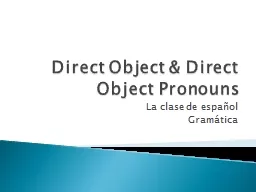PPT-Direct Object Pronouns m
Author : onionchevrolet | Published Date : 2020-08-27
e m te t le la l nous v ous les Direct Objects d irectly receive the action of a verb are not preceded by a preposition c an be people or things Direct Object
Presentation Embed Code
Download Presentation
Download Presentation The PPT/PDF document "Direct Object Pronouns m" is the property of its rightful owner. Permission is granted to download and print the materials on this website for personal, non-commercial use only, and to display it on your personal computer provided you do not modify the materials and that you retain all copyright notices contained in the materials. By downloading content from our website, you accept the terms of this agreement.
Direct Object Pronouns m: Transcript
Download Rules Of Document
"Direct Object Pronouns m"The content belongs to its owner. You may download and print it for personal use, without modification, and keep all copyright notices. By downloading, you agree to these terms.
Related Documents














